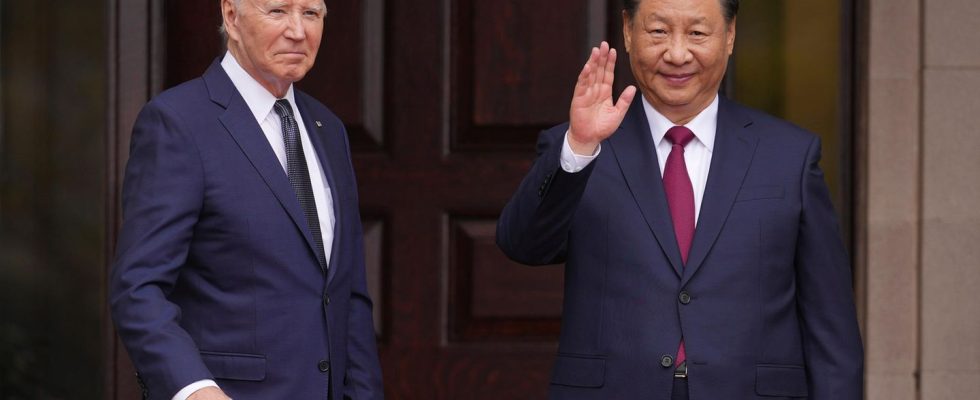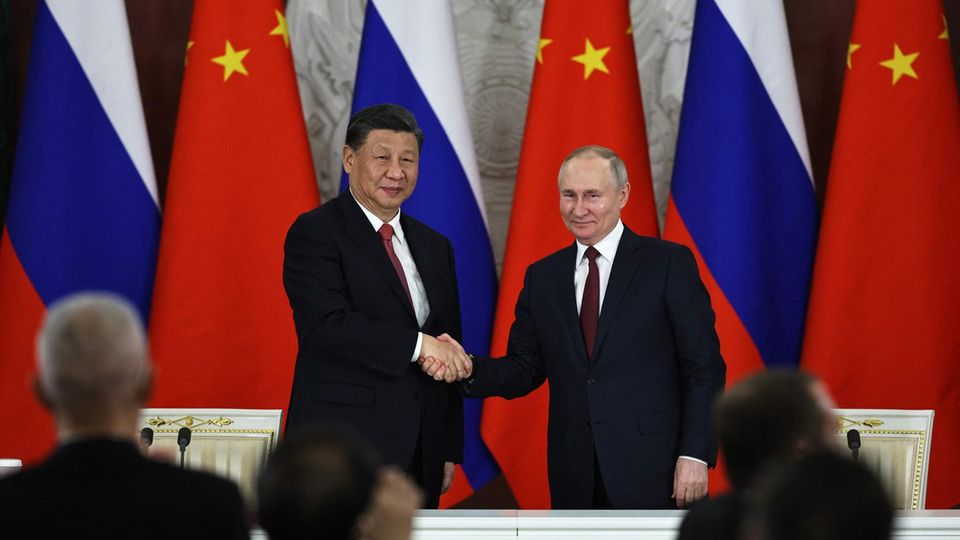USA and China
A bit of peace: Biden and Xi are talking to each other again – but topics remain taboo
Joe Biden, President of the United States, greets Chinese President Xi Jinping on the sidelines of the Asia-Pacific Economic Cooperation Conference at Filoli Estate in Woodside, California.
© Doug Mills / Pool The New York Times / DPA
After a year of complete radio silence between Joe Biden and Xi Jinping, the two presidents sat down for a long conversation in a tranquil setting. They try to send a signal of relaxation. But the idyll is a little deceptive.
Christiane Jacket, Julia Naue and Andrej Sokolow
It couldn’t be more idyllic. Meticulously trimmed box trees line the gravel path next to a pool, water splashes in the fountain, colorful lanterns dangle over rose bushes, a frog croaks next to a pond, deer hop over the meadow next door. Joe Biden has chosen a special place to receive Xi Jinping for talks.
The US president and the Chinese head of state retreat to a chic estate with lush gardens in the hills south of San Francisco to talk quietly. They didn’t see each other or speak to each other for a year. No phone call, no video connection, nothing. Now, a year and a day after their most recent meeting on the sidelines of the G20 summit in Bali in November 2022, they are meeting on the sidelines of the APEC summit in California. But not in a conference room on the summit area, but 45 kilometers from San Francisco, in an idyllic garden. Far away from the noise of the city, from the hustle and bustle of the summit, from demonstrators.
Joe Biden and Xi Jinping go for a walk
In the Filoli estate in Woodside, Biden and Xi sat together for several hours, shielded from the outside world by a large contingent of police officers. They discuss with consultants in larger and smaller groups. For lunch we have ravioli, artichokes and chicken. After dinner, the two presidents stroll through the garden. These images of the two men who lead the two largest military and economic powers are also intended to send a signal to the world: The USA and China are not about to start the next major international conflict.
In the past few months of complete radio silence between the two powerful men, there have been concerns that relations between the two states could slide into real conflict. The topic of Taiwan in particular offers potential for this. China sees the island republic as part of its territory. There are fears that China could annex Taiwan using military force. Biden has promised Taipei military assistance in such an event. So there is the horror scenario of a direct military confrontation between the USA and China. There are repeated demonstrations of military force in the area around Taiwan.
Signals of relaxation
Biden and Xi are trying to allay fears of confrontation in California – at least externally. After the conversation, the US President appeared before the press without his guest and spoke of a constructive meeting, of “important progress” and “positive steps.” Yes, both countries are in competition, he says. It is the responsibility of both sides to manage the relationship so that conflict does not arise. It’s about global stability.
Politicians, actors, business bosses
The Chinese who disappeared
Biden hardly mentions Taiwan during his appearance. Instead, the Democrat reports that he and Xi have agreed to simply pick up the phone in the future if they have concerns or need to talk – and the other person will answer. Direct communication between the armed forces of both countries will also be resumed. In recent months, Beijing has repeatedly refused to exchange views between defense ministers and military officials from both countries – despite various military incidents that the Americans wanted to talk about.
Xi also strikes a conciliatory tone in the Californian idyll. For two large countries like the USA and China, turning their backs on each other is not an option, he says at the beginning of the meeting. It is unrealistic that one side can turn the other around, and a conflict or confrontation would have “unbearable consequences” for both sides. The US and China are different on many levels, but “as long as they respect each other, coexist in peace,” they can overcome their differences. The earth is big enough for both countries to be successful.
Behind closed doors
But things weren’t all harmonious behind the scenes. A senior US government official said Xi expressed ongoing concerns about Taiwan, noting that it was the largest and potentially most dangerous area of conflict in relations with the US. Xi said he was not planning any military action and that China wanted “peaceful reunification.” However, the Chinese president quickly moved to review conditions under which force could be used.
The two presidents have little to show in terms of concrete results: an agreement to combat the import of the drug fentanyl from China into the USA, which should help Biden, especially domestically, in the election campaign. In addition, the revival of direct communication between the presidents and the armed forces of both countries, which should help reduce tensions but is simply a matter of course in other relationships. However, by their own admission, the Americans had not expected much more and had aggressively dampened their expectations of the meeting in advance.
Competitors – not friends
Both sides make no secret of the fact that they are competitors – and not friends. A moment at the end of Biden’s press conference makes this particularly clear. Asked by a reporter whether he would continue to call Xi a “dictator” after the meeting that day, Biden said: “Look, he is.” Biden awkwardly adds that Xi is a dictator in the sense that he leads a communist country “based on a form of government that is completely different from ours.” Biden’s phone may start ringing soon after this comment.


